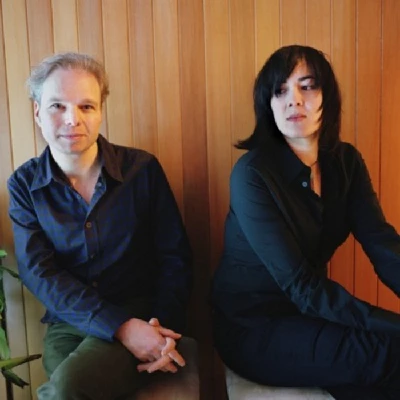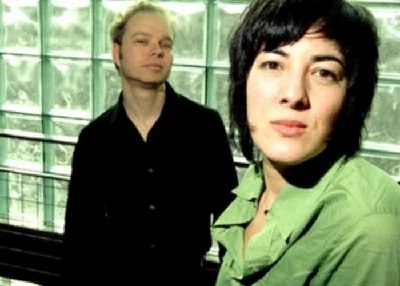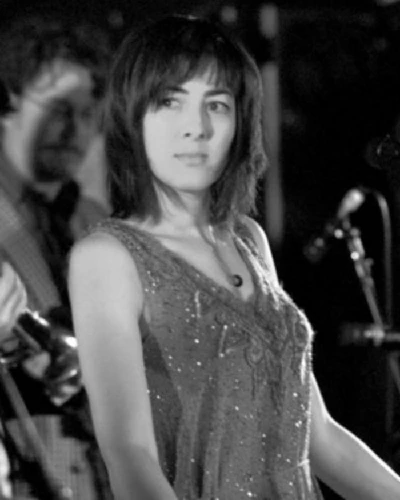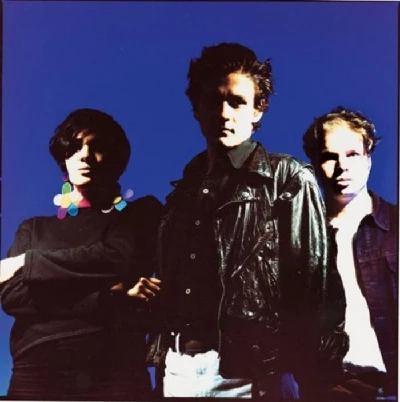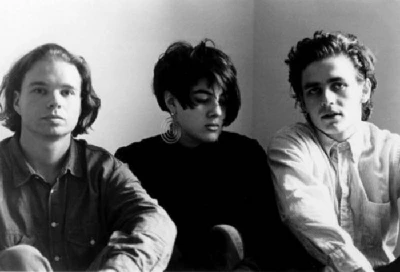published: 19 /
2 /
2009
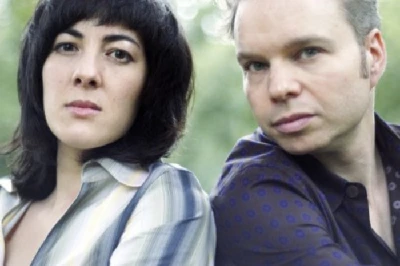
Dominic Simpson speaks to husband-and-wife team and art rock duo Damon and Naomi before a show at the Luminaire in London about their time with lo-fi psychedelic rockers Galaxie 500 and their own subsequent hightly acclaimed career since then
Article
The break-up of indie-rock darlings Galaxie 500 at the beginning of the 90s led to two divergent paths: frontman Dean Wareham went on to form the marginally more successful Luna, while the bands’ rhythm section, Damon Krukowski and Naomi Yang, have ploughed a more esoteric path as a duo. Their musical trajectory since has seen them draw in members from the Japanese psych-rock underground and members of the dubiously-named ‘free folk’ scene in their native United States.
Indeed, while Luna have perfected a more straightforward and ‘normal’ sound that only partially reflects their ‘mother’ band’s sound, it is Damon and Naomi who have redefined Galaxie 500’s legacy in more interesting and subtle ways. Galaxie 500’s trademark production, employed by producer Mark Kramer (one-time member of weirdo outfit Bongwater) – with it’s heavy use of gossamer-like reverb, narcotic guitar riffs and melancholy atmosphere that allied them sonically with Spacemen 3’s ‘Playing With Fire’, which came out around the same time –may not have been used to quite the same effect by both subsequent outfits (partly as a result of neither continuing to use Kramer as producer). But while Luna have produced some beautiful tracks – particularly their brilliant covers of Serge Gainsbourg’s ‘Bonnie and Clyde’ and, improbably, Guns ‘n’ Roses’ ‘Sweet Child O’ Mine’ – out of the two acts, it is Damon & Naomi who have been the most dynamic and have continued to confound and surprise the most, with a sense of experimentation that has cemented their originality.
So I’ve come to meet the married couple at the Luminaire in Kilburn, west London, which I seem to return to so much, where they will be performing as part of Track and Field’s ‘Winter Sprinter’ (it is January when the interview takes place). Yang is still excited about the prospect of Barack Obama’s inauguration, which will take place in six days from the day of the interview, during which time they will be on tour in Spain.
And last night at King Tut’s Wah Wah in Glasgow ?
“It was great. It was really fun and I love being in Scotland. I can’t understand anything anyone says. I always feel so rude because I’m like, ‘I’m sorry, what?’” She laughs. “Can I ask you a question? Do you think people in Glasgow cannot understand everyone else the way that we can’t understand them? Do you think that we sound as unintelligible to them?
“I love it [the Glaswegian accent]. I just wanted to clear that up. We flew in from Boston - it was a very jet-lagged show.”
Boston remains an important city in Damon and Naomi’s musical career, for it’s where they formed Galaxie 500 together with transplanted New Zealander Dean Wareham while at college in the city.
“Damon and I both grew up in New York City”, Yang recalls in the Luminaire’s backstage room. Krukowski is still attending to their equipment post-soundcheck, but will join us later on in the interview. “I took the subway to school. We lived there till we were eighteen, and then we moved to Boston to go to college.”
Speaking of Wareham, she says, “When he was like thirteen his family went to NYC [from New Zealand]. And he started the same high school there – we all went to the same high school. So we knew each other from high school and then we all just managed to go to the same college.”
Galaxie 500’s spellbinding, dreamy sound, with its often slow-moving, simple minimalist guitar progressions and drums soaked in reverb, in some way felt like a portent to the (dubiously named) ‘shoegazing movement’ that took place during the early 90s, even if concurrent bands such as My Bloody Valentine had started – at least in their ‘proper’ incarnation – at around the same time as Galaxie 500. The band’s legacy can be heard – at least partially - in everything from Ride, Slowdive and Spiritualized on this side of the Atlantic, to Mazzy Star, Low and numerous others in North America.
What’s interesting with Damon and Naomi’s subsequent career, however, is that they appear to have moved away from the opaque, reverb-heavy Galaxie 500 sound, particularly those tracks (naturally) that embrace acoustic instrumentation. Their solo material has been characterised by a progressive clearness when compared to past material.
“Well, you know, all the Galaxie 500 records were produced by Kramer, who had a very particular production ear”, Yang ponders. “I mean, it was also the late 80s, early 90s, and technology was different, but also the aesthetic was different…Kramer really loved to layer things."
“There were many layers of vocals with so much reverb. At the time, it was great for us…but I think, one thing that’s really changed for us is, in Galaxie 500 I sang very infrequently, and when I did I was very, very nervous. And the reverb really helped sort of make it all more washy...and, as a duo, we really started listening to a lot more folk music, and music that’s very lyric based…”
Indeed, the influence of British folk-rock acts such as Fairport Convention and Pentangle remain an obvious influence on the duo, distancing them further from their drone-rock roots.
“Exactly, and we got into that post-Galaxie 500, and our influences then [in Galaxie 500] were much more the Velvet Underground, Big Star, punk rock...our peers at the time…you know, it was punk rock and very psychedelic stuff, like that. And then we started playing as a duo, and playing more acoustically, and it also coincided with our listening to a lot more acoustic music, like folk music…and it’s sort of like, the lyrics in Galaxie 500 were always the very, very last thing that anyone thought about.”
Whereas now you’re paying much more attention to them ?
“Absolutely, and we’re also singing them, which, you know, in Galaxie 500 being the rhythm section…you know, Dean doing the singing…”
That said, those Galaxie 500 tracks that do have Yang singing are among the band’s most beautiful, from the breathtaking seven-minute cover of Yoko Ono’s ‘Listen The Snow Is Falling’ on 'This Is Our Music' to the dreamy dreamy ‘Another Day’ from 'On Fire', with its choral-like verses eventually sung by all three band members (plus producer Kramer) together beautifully.
“We [Galaxie 500] had this thing that whoever sang the covers had to have some conviction about it”, Yang states. “But it wasn’t till we started working as a duo that we had a lot more songs that we had to have conviction about the lyrics. It really changes things all of a sudden when you’re communicating with the audience in this verbal way”.
Whereas previously you were mostly playing bass…
“Yeah, well I very reluctant to be more forward on the stage…I was more comfortable with, ‘I’ll just stay back and play bass’.”
This focus on lyrics is particularly acute on the closing track of 2007’s album 'Within These Walls', ‘Cruel Queen’. With a melody adapted from the traditional song, ‘The Trees They Do Go High’, it has a medieval English folk feel to it, with its slow, deliberate delivery of the story of a Queen in her castle who battles with her daughter for the future of their reign. Yang’s wistful yet measured voice brings to mind Sandy Denny-era Fairport Convention and Pentangle, two acts who regularly covered traditional British folk songs in a new light (particularly the former band’s version of ‘Tam Lin’ on 'Liege and Lief'). Pentangle actually had their own take on the song called 'Cruel Sister', on the album of the same name.
“I didn’t want it to be like acting, because I don’t think I’m an actress - you have to tell it very clearly, because that’s the way that you do it”, Yang reflects. “I love 'Liege and Leaf'…but I thought, ‘I can’t sing these lyrics’,” she says, referring to the original verse of 'The Trees Do Grow High'. “The melody [from 'Cruel Queen'] is from 'The Trees...', which is a beautiful melody, but the lyrics I just found. The original story is about a girl whose father insists she marry this thirteen year-old boy, because it’s a good match...but she’s much older, so the whole song’s about her waiting for him to grow up."
“I threw away the [original] lyrics”, she explains. “Damon told me that Bob Dylan used to do that all the time – he’d take a great melody, like with [his song] 'Masters of War' - and the melody is 'Nottingham Town'...there’s a Fairport Convention cover..."
“Anyway, so I threw away those lyrics. About the girl who was married to the 13 year-old boy. And what I did do is that I took some of the lines, and I rewrote it, and then remade it with the story of King Lear.”
Later on in the evening, the band will finish their set with the song, a hushed, reverent silence slowly permeating through the crowd. It’s a spellbinding way to finish the evening’s performance.
“Well, you know, what’s amazing is that when we do it in the UK and Ireland – anytime that we do it, people really listen to it and they really get it. And that’s amazing, because we’re doing all these clubs…but it’s like it’s in your blood….because, I mean, we do it all over the world, and some places – it’s repeating the melody, and it’s a long story…you know, with other places – the attention span, you can just tell...[whereas] you can really feel people listening to the words here. I just think that’s amazing. I always love that…it’s really fun to bring it to the UK – you know, ‘yes we breathe this’”, she smiles.
“The thing is, I was reading…I spent a long time before we wrote that record listening to a lot of English folk rock, and I have my TradFolk playlist on my iPhone…these are the same songs, but by different people…but anyway, you know, here’s the Pentangle version of ‘The Trees Go High’ [‘Cruel Sister’]…but it was really interesting to hear…I was listening to how the different singers sing the same song – it was so interesting, you have five different singers doing the same song, all the different interpretations.”
Which brings us back to the mention of how, right from the Galaxie 500 days, Damon and Naomi have always had a penchant for covers, from the aforementioned songs to their sublime version of the Velvet Underground’s 'Here She Comes Now', Big Star’s 'Blue Moon' and the Beatles’ 'While My Guitar Gently Weeps'.
“Well, you know, it’s fun to do covers, because you definitely learn so much about how someone else put together a song, in a different way to just listening to it”, she ponders. “You know, you take a song that you like and you play it and you learn something…also if there’s a song that you kind of wish you’d written, but you didn’t, you get to play it. You get to sort of inhabit it.”
The issue of Damon and Naomi’s affinity for folk music runs concurrent with the heightened recent interest in the genre, with the likes of Devendra Banhart, MV & EE, Fleet Foxes, Vetiver and Espers experimenting with their own take on the genre (some more successful than others), along with many others. What’s interesting is that Damon and Naomi have experimented with folk rock far earlier than any of these outfits.
As Krukowski tells me later on when he joins the interview, “We’re a bit older than most of those bands, so the funny thing is that when we started doing this – I mean, touring with just an acoustic guitar – it was really, really weird…we’d come to venues and the soundman was complaining, and it was kind of unheard of on the circuit what we did. It was like the indie-rock circuit, and to walk in with that amp [points to a small amp suited for an acoustic-electric guitar] was just ridiculous. And the number of times that we had sound people tell us that it was impossible to mic us, that it would never work… we were just too quiet, and they had trouble with the harmonium at the time, a non-electric keyboard that we had…everything was just like feedback onstage, because the soundmen were just so used to normal loud…well, like indie rock bands – not heavy metal."
"Now, we see like Matt Valentine and Erika Elders showing up with a dog, and nobody’s saying anything...I think that’s fantastic. Well, they can’t bring the dog to Europe (laughs) – there’s a dog with them in the US [when they tour]. They might bring a whole hippie camper van with them, and everything’s just scattered around the floor, and it’s all these instruments…there’s a harmonium – everyone’s got a harmonium [now].”
In some ways, then, various strands of indie rock and guitar music have come round to Damon and Naomi rather than the other way round. And their friendship with some of these acts is reflected in the fact that Espers’ Swedish cellist Helena Espvall has joined them on tour.
“Yeah, we’ve known Espers for a long time, and we love them,” Yang enthuses. “She’s wonderful. We were looking for people to play strings on the last record, 'Within These Walls'.” Espvall’s droning cello that opens the first and last song on the DVD of 'Damon and Naomi Live in Japan is an unearthly and ghostly beast indeed, and when combined with the droning e-bow guitar playing of Ghost’s Michio Kurihara, brings to mind dark, pagan-like waves of intense sound rather than anything pastoral. The six members on stage during the DVD’s highlights of two nights of performance in Tokyo – Damon and Naomi, Kurihara, Espvall, Masaki Batoh (another member of Ghost, who has recorded a collaboration album with Espvall), and Bhob Rainey on alto-sax (an old friend of the band who does his own experimental music) – spin new variations on the duo’s sound, reinventing and twisting inside the songs. Or, as Krukowski puts it, “it gave us access to a lot of different sounds”. Many of them also appear on the duo’s records, often to mesmerising effect, such as on the heavenly title track of 'The Earth Is Blue', soundtracking a gorgeous sunset. In contrast, their performance tonight at the Luminaire will be a much more stripped-down affair.
Both Yang and Krukowski are particularly effusive about Kurihara’s presence live and on the duo’s records (living in Japan, he’s naturally only a ‘part-time’ member of the band), together with Ghost generally, with whom the duo also collaborated on an album.
“You don’t get to see, but they had actually played an opening set on one of those two nights [on the DVD] – one night Ghost played, and on the other night they played as a duo”, Krukowski recalls. The mystical Japanese band’s own work has explored folk, jazz, psychedelia and improv – particularly with the stunning half-hour long ‘Hemicyclic Anthelion’, which explores more directions in a single song than most bands do in a career.
“Yeah, well that has a long history, the one with Ghost. We met them in 1995 – they had just released their second album in Japan. We were fans of the record – we know Forced Exposure in Boston. And they were bringing the records in [on import] – it was the only place you could get the record. We were fans, and we got in touch with them – and then we ended up touring with them. So we’ve known them a long time. And they met Drag City, who then started releasing their records on that tour...so it’s a long history, and then we made a record together in 2000 ['Damon and Naomi with Ghost']. And so in the wake of that album, a lot of members of Ghost couldn’t tour behind it because they had day jobs and whatever…but Kurihara the guitarist was available, so we went as like an abbreviated version of that album."
"We brought him on that tour, and he didn’t speak a lot of English at the time. Now it’s fantastic. So we did that together and it really clicked, and so we just did a lot of touring as a trio...so we worked with him steadily over time. He’s an incredible e-bow player.” This small, black ‘instrument’, which looks like a weirdly shaped Date Stamp, omits an electrical pulse which, when held against the guitar strings, produces a sustained, pulsating drone. However, it can be volatile and difficult to master, due to its propensity to produce screeching tones if not controlled correctly (believe me, I’ve tried). Kurihara’s e-bow playing on the DVD is nothing if not masterful.
Despite having been involved in music for more than twenty years now, the duo seem to be as busy as ever. Apart from this European tour and their music in general, Damon and Naomi have been busy in other ways: running their own publishing imprint, Exact Change, devoted to left-field and avant-garde writings; Krukowski’s sideline as a writer; and Yang’s work as a photographer and graphic designer. They also run their own record label, 20-20-20, with which they’ve released many of their own material as well as others.
“Well, that’s just our label, just for practical reasons”, Krukowski clarifies. “We’re holding onto our own rights…and we’re doing that ourselves with our manager, through a company called Revolver in the US. We did Kurihara’s solo record. And we did a compilation of singers we really loved from Japan and Korea.”
As for their home studio, which they run from their place in Cambridge, Massachusetts, Krukowski remarks, “We’ve actually been recording ourselves since we stopped working with Kramer in 1995…1997. 'Playback Singers' is the first record we did without [him], in our studio; at the time it was just an ADAT machine and a couple of mics; then it was two ADAT machines; and then it was three ADAT machines…like that. So, it was out of necessity at first but then we got very used to it. So we still record ourselves - that’s another thing we started doing a little earlier than everybody.” The increasing availability of home-recording equipment at an affordable price has led to punk’s mantra of ‘anyone can do it’ becoming something of a reality in the last ten years – though Damon and Naomi were doing it earlier than many.
“Now, it makes perfect sense. Recording at home…when we first started, the first thing we brought was in 1995. And it wasn’t unheard of…but to bring Sub Pop your home recordings and say, ‘put it out’ was kind of weird…now it’s just totally standard.”
We’re nearing the end of interview; Yang has popped away to deal with the merchandise, and I’m left with Krukowski. The soundcheck from the support act is getting louder, drowning out our discussion. Are there any other music activities that Damon & Naomi have been involved with?
“There was a band that we had with our friends Kate and Wayne from Twisted Village record store”, recalls Krukowski, referring to a record shop in Cambridge, MA. “That was in the mid-1990s. It was very loud and psychedelic – we were the rhythm section. Everyone hated it. It was another thing that kind of came ahead of its time...it was sort of all instrumental, half-hour long songs…very psychedelic”. He laughs at the memory. And with that, he stands up. “I’m going have to go.”
Picture Gallery:-
